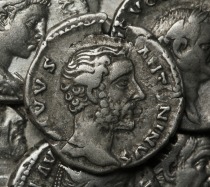Scripture
Luke 20:21-25 NIV
So the spies questioned him: “Teacher, we know that you speak and teach what is right, and that you do not show partiality but teach the way of God in accordance with the truth. Is it right for us to pay taxes to Caesar or not?” He saw through their duplicity and said to them, “Show me a denarius. Whose portrait and inscription are on it?” “Caesar’s,” they replied. He said to them, “Then give to Caesar what is Caesar’s, and to God what is God’s.”
Consider
Although we may debate exactly what Jesus meant in his reply, there is irony in his statement that every faithful Jew present would have recognized. “Give to Caesar what is Caesar’s” must ultimately mean “Caesar deserves nothing,” because everything on earth—including nations, kings, and material wealth—belongs to God.
As believers, we acknowledge that all we have and all we are, down to our very breath, is given to us by our Creator. Yet we live our lives as if we were owners, not stewards, of our gifts. Hannah, the mother of the Old Testament prophet Samuel, had the right idea when she told Eli the priest, “I prayed for this child, and the LORD has granted me what I asked of him. So now I give him to the LORD” (1 Samuel 1:27-28). Can we follow Hannah’s example and give back for the Lord’s use what we have received from Him, that is, our money, our time, our possessions … our relationships?
For a moment, consider a particularly troubling relationship in your life to be a gift from God. What would it mean to acknowledge God’s sovereign right of control over this human connection? What might “giving it back to God” look like? Here are a few ideas:
In giving this relationship back to God, I …
- try to see what God might desire for me, for the other person, and for the relationship.
- consider what God wants me to learn about following Jesus in this relationship.
- stop trying to control the other person’s behavior.
- stop pushing for a good outcome for myself.
- consider the gifts, talents, and skills God has given me and how He might want me to use them in this relationship.
- consider why God has placed me at this particular time with this particular person.
- consider what this relationship can teach me that I might not otherwise learn.
- trust God to give me exactly what I need to deal rightly with this other person.
- watch for God’s movement and stay open to learning more about God’s nature through my interactions with this person.
- learn to rely on the Spirit’s direction, comfort, and protection as I deal with this person.
- practice patience, kindness, and forgiveness, even when I don’t feel like it, because I know this is what God desires.
Pray
FATHER, your gift of free will often deludes me into thinking that I am the divine authority of my own life. Forgive my presumption. Help me to understand my true place so that arrogance will not blind me your sovereign presence or the evidence of your grace all around me. Teach me practical ways to surrender my relationships to you, and let my obedience bring you glory.
Reflect
Psalm 24:1; Daniel 4:34-35
Ponder
How might acknowledging God’s ownership of a relationship change my behavior?








